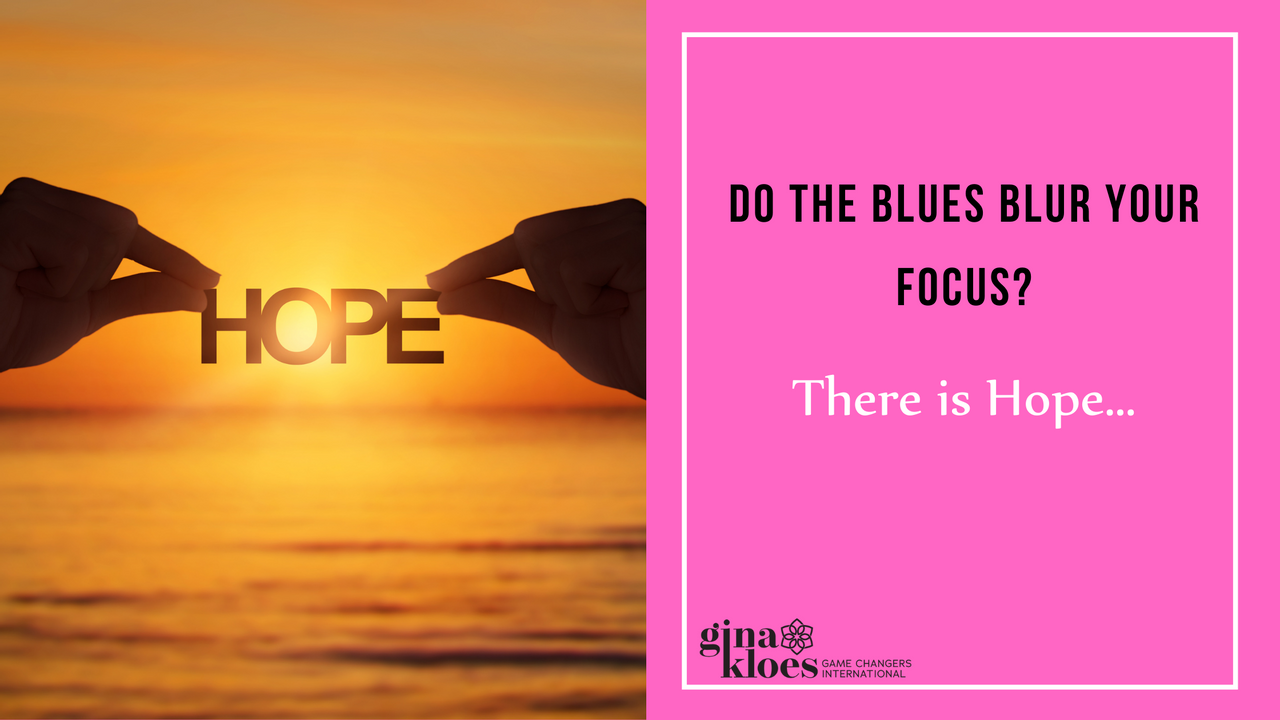Do the Blues Blur Your Focus? There is Hope…
Apr 08, 2018
GOT THE BLUES?
Feeling hopeless and sad for a long period of time? Lacking interest in activities you once enjoyed? Restlessness? Tired most of the time? Having a hard time concentrating or making decisions? These are some of the signs that you may be depressed.
BUMMER DAYS VS. REAL DEPRESSION
Different than just having a bummer of a day that happens once in a while, major depression affects almost 15 million adults in the United States every year. And it’s likely that even more people have minor bouts of depression that are not diagnosed.
Before taking a look at how depression affects the brain’s focus, take a peek at some of the causes and triggers for depression:
SWIRLING IN STRESS
Although depression can be caused by many things, one important contributor to depression can be chronic stress. A stressful life can affect brain chemistry that can lead to poor coping skills and potentially more severe depression.
STRESS AFFECTS OUR CHEMICAL BALANCE
Some studies link stress and depression because of increased flow of stress hormones such as cortisol and adrenaline, and reduced neurotransmitters such as serotonin and dopamine, which also can trigger depression.
Biological processes like sleep, energy level, appetite, emotions, and even mental capacity are regulated through chemicals in the brain. Stress throws these chemicals off balance which can make it difficult to cope. Over the long term, this can turn into depression.
DEPRESSION AND WINTER BLUES
Some people find that the gray winter days can be a particularly depressing time of life, especially for people who live in northern areas with less sunshine. Also called Seasonal Affective Disorder (SAD), the good news is that depression during winter can be proactively handled because the calendar tells you when it’s coming.

WHAT ELSE CAN CAUSE DEPRESSION?
Other factors that can trigger depression include genetics, hormone changes due to pregnancy or menopause, biochemical reactions in the brain, medical problems, certain medications and even vitamin deficiencies.
ASK FOR HELP
If you struggle with depression, please seek out care from a medical professional. There are plenty of options available to treat depression including lifestyle adjustments, medication, or other alternatives. Working in partnership with a physician to determine an effective treatment plan is critical to restoring balance in your life.
NO ONE SIZE FITS ALL
Depression is not the same for everyone, but many people experience similar problems focusing, concentrating, remembering and decision making.
IMPACT
Here’s a look at some of the critical functions impacted by stress and depression.
DOWN THE RABBIT HOLE.
Research finds that depression can create a great deal of ‘rumination’. This can be the tendency to spend time repetitively thinking about problems in life… Basically feeling miserable which leads to more depression and less pleasure… Then the cycle repeats and down the rabbit hole you go. Remember, as Tony Robbins, the International Speaker & Peak Performance Coach says, “Where focus goes, energy flows.” Notice if you are focusing on all that is wrong with life. How does that make you feel? Consider how you might feel focusing on the good in life. Try it for a moment. What is this gift in this moment? What lesson can I learn? How can working through these experiences strengthen me for my future?

REMEMBER WHAT?
Chronic depression can interfere with your ability to remember details, facts, thoughts and ideas. Research finds that the longer a person is depressed, the more memory loss is likely to occur.
FUZZY BRAIN.
Brain scans reveal that depression can result in unclear thinking with lagged response times. Research finds that the ‘executive function’ areas of the brain which control problem-solving, reasoning, and memory function less for depressed people when compared to people without depression.
YOUR BRAIN SHRINKS!
The hippocampus is the part of your brain that forms memories and emotions. Research finds that it shrinks when people are depressed! This not only affects your ability to memorize or recall facts, but also can interfere with your actual sense of self. The good news is that this condition is reversible and the brain can return to normal size with treatment.
NOW FOR THE GOOD NEWS
For people who are challenged with chronic stress and depression, there are options for restoring health, balance and focus!
Practice the following tips to help you on your journey to a more joyful fulfilling life.
GIVE YOURSELF A BREAK
Start with simply remembering to be patient and kind with yourself. Often people overlook the beautiful option of merely giving yourself a break. Begin with a mere pause to stop and take a few deep breaths, breathe in some fresh air, enjoy a cup of tea and just take a few moments to find your balance, even if it’s just for a moment.
Frankly, the tips in this article are for everyone who might find themselves feeling blue. This included people are not diagnosed “depressed.” These techniques can help you find your focus when you wobble against that slippery slope of life. These techniques can also nurture your focus, creativity, and innovation.
WHAT’S WITH ALL THIS MINDFULNESS CHATTER?
Mindfulness is the ability to be fully aware in the present moment without judging yourself or others. It’s the mere ability to just notice what is happening without commentary. One study shows that the brain’s gray matter can actually be rebuilt with simple meditation practices in as short as eight weeks. Gray matter is the part of the brain that correlates with memory, intelligence, creativity, and other critical functions. You definitely want more gray matter in your life!
Learning to chill out in a meditative way can have enormous impact on your mental and physical health! Mindfulness and simple meditation work to help your brain re-set itself. This can actually stop the chaos in the brain and reduce depression. A growing body of research shows that mindfulness-based therapy may even work as an antidepressant treatment option, without the side effects of medication.

SLEEP
Sleep is critical for healthy living—for strength and energy, disease prevention, and optimal brain function. There is a strong link between depression and sleep deprivation. Up to 90% of people with depression complain about their quality of sleep. People with insomnia run a much higher risk of developing depression. And many people find their depressive symptoms are reduced when insomnia is treated.
We need sleep for our body to restore and regenerate every day. Sleep affects the brain, the mood, and depression!
A WALK AROUND THE BLOCK.
A strong link exists between lack of exercise and depression. It’s time to get up and move! Regular exercise can keep your body in shape, help you chill out, beat stress, and battle against depression – all at the same time. You could even start with a 5-minute walk around the block. It doesn’t always have to be a muscle pumping, sweat driven hard-core gym workout. Studies show walking is one of the best forms of exercise. If you start with enjoyable short moments of exercise that you enjoy, your body and mind with imprint enjoyment with exercise and you will be more motivated to do more!
AN APPLE A DAY.
Yup – haven’t we heard enough about healthy eating? Well, the age-old advice still rings true. Here it is again: Eat Healthy!
Healthy foods give you the energy your body needs. Plus, missing essential vitamins and minerals have been shown to increase the risk of depression. Aim to eat fresh food and avoid sugars, additives, chemicals, processed foods, and preservatives. In short, eat foods that come from farms, not factories! How about starting with an apple a day? Simple steps every day consistently taken can lead to life transforming results. One apple at a time. One decision at a time. One day at a time.
LIGHT UP.
Research shows that exposure to light is a simple way to treat the winter blues and other related depression. Seasonal Affective Disorder is a form of depression associated with a lack of light. If it’s sunny where you live, get outside and enjoy it! If not, consider using a light therapy box to help you get that daily dose of “sunshine” that your body and brain need. Also, check with your doctor about whether you need Vitamin D supplements. Ironically our use of sunscreens has led to many people being Vitamin D deficient.
THE POWER OF POSITIVE THINKING.
Some people say positive thinking is mumbo jumbo.
Yet when we shift our focus away from what is wrong to looking for what is right, we actually interrupt the cycle of rumination! What is wrong is always available if you look for it. Interestingly, what is right is also available! Try it.
Think of a situation in your life that is troubling you. Start by focusing on all that is wrong in life and this situation. Easy, right?
Now focus on all that could be good about this situation. Ask yourself what is the gift in this experience, what is the lesson, what is the magic in this moment? Ask yourself, if I had to find one or two positive things about this situation what would they be?
You may say, “there is nothing positive about this!” Dig deeper. Is that really true? Are you selling yourself short just by making that statement? If your life depended on you finding the positive lesson in the situation, what would it be?
There are lots of places to find a positive outlook in life. Listen to positive-thinking podcasts. Watch Youtube videos of good thing, lessons, magical moments. There are wonderful audio and written books. Retrain your brain by noticing every negative thought and intentionally shifting it to a positive one.
Your brain is just like any other muscle. It takes training and conditioning to create what you want in life. For more on how to train your brain check out my article called, “The GPS of Your Mind.” You can get that HERE.
WHO HAS YOUR BACK?
If you want to know who someone is, just take a look at the five people they spend the most time with.
Are you with people that lift you, support you, and inspire you to be your best? Or, are you with people that belittle you, encourage unhealthy behavior, and drag you down? If so, is it time for new friends? Knowing that someone has your back makes a huge difference!
Partner up with friends or family members to get the support you to live a joyful healthy life. Great friends can remind you to eat healthy, sleep well, exercise often, think in a healthier more positive manner, and get medical help if necessary.
Maybe it’s time to “love away” the friends that bring you down and swirl negative habits around you…and find friends that lift you to the joy and health you so deserve!

JOIN US
If you would like a deeper understanding of these issues, join our Chill Out to Focus, Create & Innovate community to truly experience focusing your brain in a deeper way…. Check out our programs HERE.
Be Well, Be Joyful, Be Inspired…
Have a Beautiful Day…

Gina Kloes
To learn more about being a mindful entrepreneur and game changer in this world, please contact Gina’s team at [email protected].





